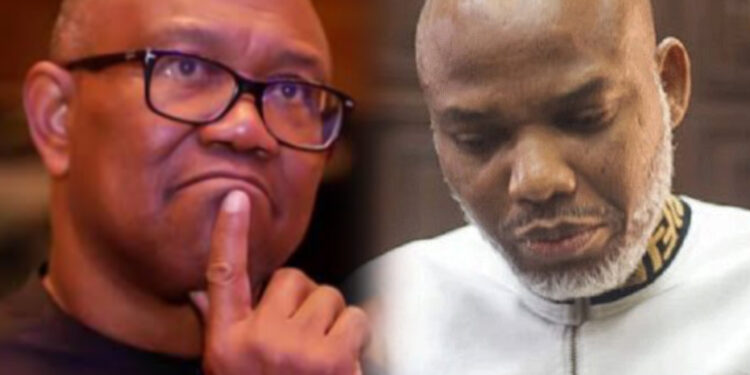Peter Obi calls for dialogue, reconciliation, and political solutions following Nnamdi Kanu’s conviction, urging leaders to prioritize unity and national stability.
The conviction of Mazi Nnamdi Kanu has emerged at a particularly delicate period in Nigeria’s history one marked by intense economic strain, widespread insecurity, and growing discontent over governance failures. Rather than easing tensions, this development risks heightening national anxieties and further polarizing an already divided nation.
It is important to state, as I have consistently maintained over the years, that the arrest, prolonged detention, and subsequent conviction of Kanu were avoidable outcomes. They represent not only a misreading of the underlying issues but also a deeper failure of leadership at critical moments when statesmanship was required.
For years, I have advocated for constructive dialogue, inclusive governance, and sustained engagement as the most viable mechanisms for addressing agitation and restoring national harmony. Coercive measures, in any democratic society, ought to be considered only after all reasonable avenues for dialogue have been thoroughly explored. In this instance, it is evident that such avenues were neither exhausted nor meaningfully pursued.
Kanu’s concerns were neither unknown nor insurmountable. They reflected long-standing grievances that, in functional democracies, are approached through dialogue, reforms, and a willingness to listen. Addressing such issues requires not force, but empathy, wisdom, and an unwavering commitment to justice and national cohesion.
Regrettably, the government’s handling of the situation has reinforced distrust and created an unnecessary distraction at a time when citizens are already battling inflation, insecurity, and economic uncertainty. While some may argue that “the law has taken its course,” leadership especially in complex, multi-ethnic nations often demands more than procedural legality. Around the world, political solutions, negotiated settlements, and reconciliatory measures are employed when legal processes alone cannot guarantee peace or foster unity. Nigeria should not be an exception to these global best practices.
Indeed, the approach adopted in Kanu’s case resembles a man who, trapped in a hole, continues digging deeper instead of seeking a path out. Such a posture compounds not only the government’s challenges but also the collective struggles of the Nigerian people.
If we are genuinely committed to building a peaceful, united, and progressive nation, then our leaders must prioritize reconciliation over retaliation, dialogue over division, and healing over hostility. Only through fairness, justice, and compassion can Nigeria chart a path toward a future in which every citizen feels secure, valued, and heard.
ALSO READ: CAN Confirms 227 Abducted in Midnight Attack on Niger State School
At this critical juncture irrespective of divergent opinions on the court’s judgment I call on Nigerians to remain hopeful that peace and reconciliation will ultimately prevail. I further urge the Presidency, the Council of State, and respected statesmen dedicated to national cohesion to intervene constructively and work toward a lasting, inclusive solution.
— Peter Obi


